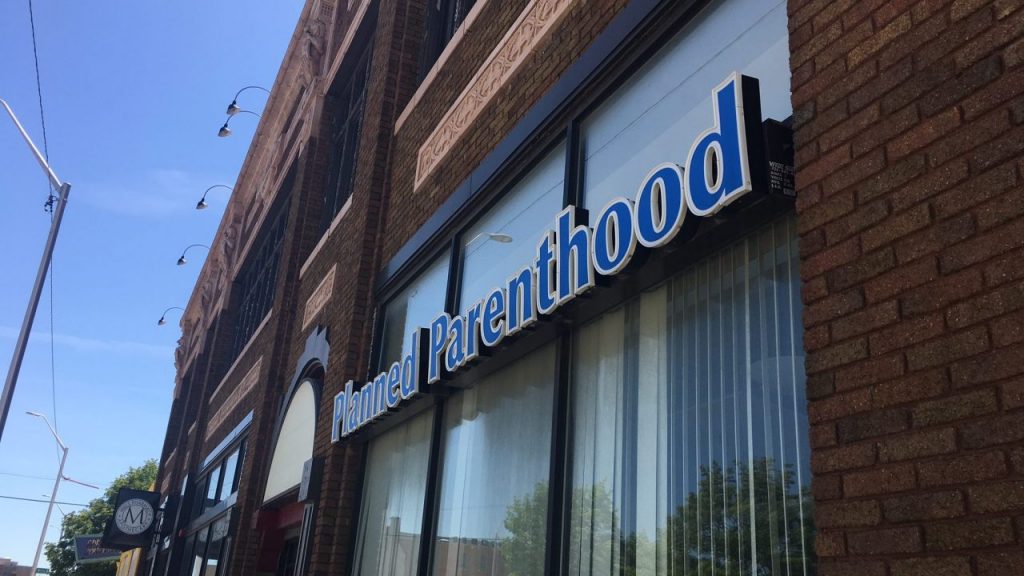Michigan Would Revert to Restrictive Abortion Ban If Roe v. Wade Is Overturned
If the landmark 1973 case is overturned, Michigan would suddenly have one of the most restrictive anti-abortion laws in the country back in full effect. A 1931 law says that providers who carry out abortions are guilty of a felony.

The U.S. Supreme Court’s decision on a Mississippi abortion law could have a big impact in Michigan. The nation’s highest court recently heard arguments in Dobbs v. Jackson Women’s Health Organization last week, and a decision by the court is expected this summer.
As part of the weekly series MichMash, Slate’s Cheyna Roth and WDET’s Jake Neher talk about what the landscape for abortion services would look like if the landmark abortion rights case Roe v. Wade is overturned.
Subscribe to MichMash on iTunes, Spotify, Google Podcasts, NPR One or wherever you get your podcasts.
Oral arguments in front of the U.S. Supreme Court in Dobbs v. Jackson Women’s Health Organization seem to have confirmed what many legal experts had assumed up until this point — that the Supreme Court’s newly cemented conservative majority are moving in the direction of eroding Roe v. Wade to the point where some say it would be like it isn’t even there. The cornerstone decision cemented the right to abortion access in America in 1973.
While there isn’t a ruling yet, Slate legal correspondent Dahlia Lithwick writes that, “Oral arguments made clear that this court will overturn Roe.”
And that will have a huge impact here in Michigan and many other states in terms of access to abortion services. Lithwick joined WDET’s Stephen Henderson on Detroit Today and said that going back to a pre-Roe world would have a disparate impact in states where abortion would either be illegal or very restricted.
“I think what you’re going to really see is a reversion to a country in which wealthy women — Justice Ginsberg would always say — will always be able to get an abortion,” Lithwick said. “But the women who most desperately need them — women of color, poor people who can’t travel, immigrants who can’t necessarily freely cross state lines, they’re going to lose all access.”
Related: What We Learned From Supreme Court Oral Arguments in Landmark Abortion Case
Whether the court overturns Roe, erodes it or narrows it down, or just throws its hands up and says the states get to decide — it’s pretty much all on the table. Everything is going to depend on what the court writes in its opinion. But many are saying that it will likely say that it’s up to the states to decide — effectively overturning Roe.
In Michigan, if the Supreme Court overturns Roe we would suddenly have one of the most restrictive anti-abortion laws in the country back in full effect. A law from 1931 criminalizes abortion as manslaughter. It says that providers who carry out abortions are guilty of a felony, except when it’s necessary to save the life of the mother.
Gov. Gretchen Whitmer is calling on the state Legislature to repeal that law. Democratic State Sen. Erika Geiss already has a bill to do just that. But, of course, the Legislature is controlled by Republicans, who have already said that’s not going to happen on their watch.
“I think what you’re going to really see is a reversion to a country in which wealthy women – Justice Ginsberg would always say – will always be able to get an abortion. But the women who most desperately need them – women of color, poor people who can’t travel, immigrants who can’t necessarily freely cross state lines, they’re going to lose all access.” –Dahlia Lithwick, Slate
State Senate Majority Leader Mike Shirkey has, in the past, compared abortion to slavery. He told The Detroit News recently, “The primary charge of any government or government official is to protect the life of the innocent. Michigan Senate Republicans will not waver from this fundamental duty to protect the sanctity of life.”
Michigan is not the only state that would outlaw abortion if Roe is overturned. According to the Pew Charitable Trusts, 12 states have trigger laws that ban all or nearly all abortions if Roe is gone. And 14 states have bans still on the books that predate Roe or have been enacted but not used since Roe. Some even have both.
But at the end of the day, it is all going to come down to the exact wording the court uses. And if we’ve learned anything from past opinions by this court — it’s going to be anything but clear cut going forward.
More from MichMash:
Evidence from Massive Rape Kit Backlog Yields More Than 200 Convictions, Lasting Policy Changes
Infrastructure Package Could Be Big Boost for Michigan, But Major Challenges Remain
School Voucher Supporters Hope to Get Around Whitmer’s Veto
Trusted, accurate, up-to-date.
WDET strives to make our journalism accessible to everyone. As a public media institution, we maintain our journalistic integrity through independent support from readers like you. If you value WDET as your source of news, music and conversation, please make a gift today.
